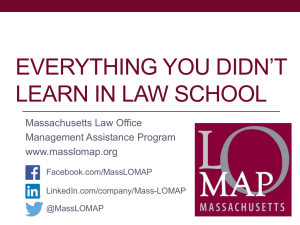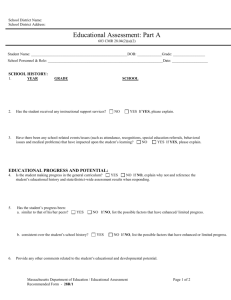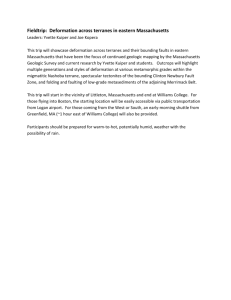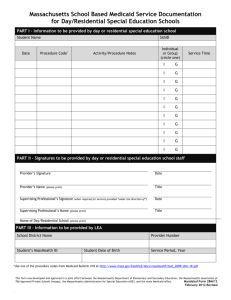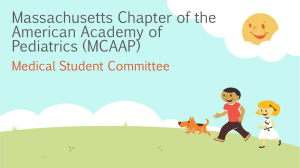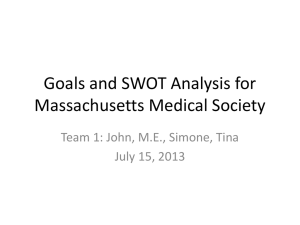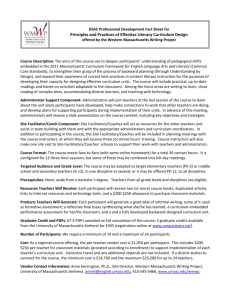Raise Up Massachusetts Submits Constitutional Amendment
advertisement
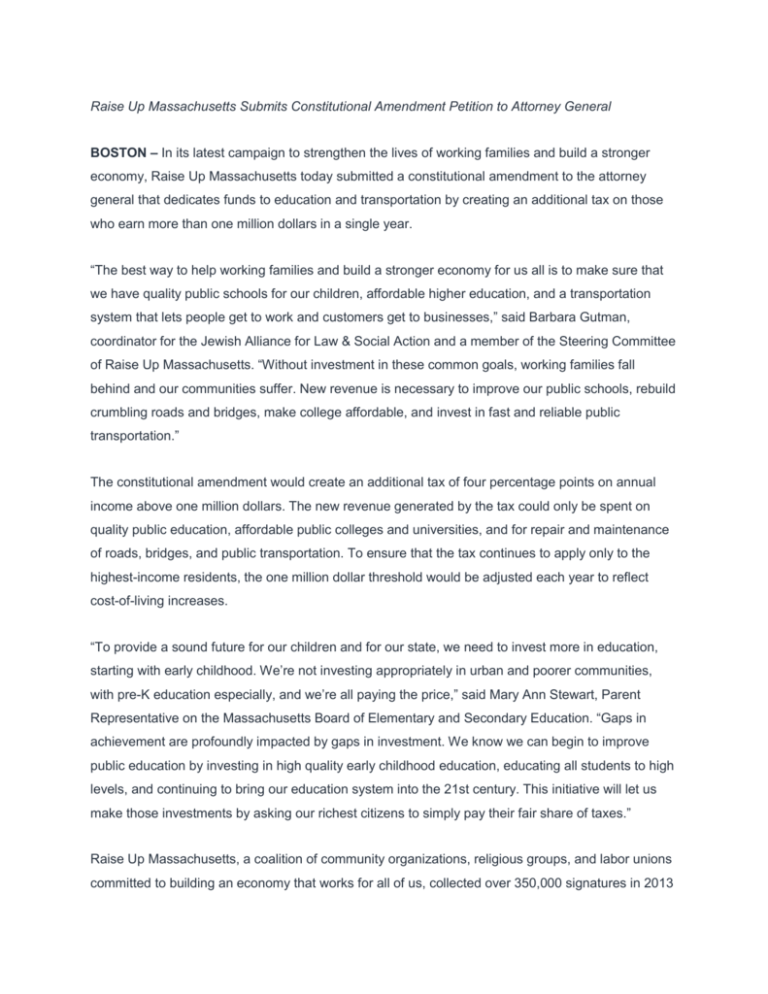
Raise Up Massachusetts Submits Constitutional Amendment Petition to Attorney General BOSTON – In its latest campaign to strengthen the lives of working families and build a stronger economy, Raise Up Massachusetts today submitted a constitutional amendment to the attorney general that dedicates funds to education and transportation by creating an additional tax on those who earn more than one million dollars in a single year. “The best way to help working families and build a stronger economy for us all is to make sure that we have quality public schools for our children, affordable higher education, and a transportation system that lets people get to work and customers get to businesses,” said Barbara Gutman, coordinator for the Jewish Alliance for Law & Social Action and a member of the Steering Committee of Raise Up Massachusetts. “Without investment in these common goals, working families fall behind and our communities suffer. New revenue is necessary to improve our public schools, rebuild crumbling roads and bridges, make college affordable, and invest in fast and reliable public transportation.” The constitutional amendment would create an additional tax of four percentage points on annual income above one million dollars. The new revenue generated by the tax could only be spent on quality public education, affordable public colleges and universities, and for repair and maintenance of roads, bridges, and public transportation. To ensure that the tax continues to apply only to the highest-income residents, the one million dollar threshold would be adjusted each year to reflect cost-of-living increases. “To provide a sound future for our children and for our state, we need to invest more in education, starting with early childhood. We’re not investing appropriately in urban and poorer communities, with pre-K education especially, and we’re all paying the price,” said Mary Ann Stewart, Parent Representative on the Massachusetts Board of Elementary and Secondary Education. “Gaps in achievement are profoundly impacted by gaps in investment. We know we can begin to improve public education by investing in high quality early childhood education, educating all students to high levels, and continuing to bring our education system into the 21st century. This initiative will let us make those investments by asking our richest citizens to simply pay their fair share of taxes.” Raise Up Massachusetts, a coalition of community organizations, religious groups, and labor unions committed to building an economy that works for all of us, collected over 350,000 signatures in 2013 and 2014 on behalf of two ballot initiatives: raising the minimum wage and guaranteeing earned sick time for all Massachusetts workers. In June 2014, the Legislature passed and the governor signed legislation giving Massachusetts the highest minimum wage in the country. Raise Up Massachusetts then led the campaign to ensure access to earned sick time for all workers in the Commonwealth by passing Question 4 in November 2014. “Our crumbling roads, bridges, and outdated public transportation system is a direct result of decades of insufficient funding,” said Siggy Meilus, a Bus Riders United organizer for the Community Economic Development Center in New Bedford. “Access to safe and reliable transportation is necessary for economic development, access to education, and providing independent living for seniors and persons with disabilities. In order to have a thriving community and state economy we need a transportation system that meets the needs of the Commonwealth.” This fall, Raise Up Massachusetts plans to collect certified signatures from at least 64,750 registered voters (three percent of total votes cast for all candidates for governor in 2014). If enough certified signatures are collected, then the petition must go to a Joint Session of the Legislature and be approved by 25 percent of legislators (50 votes) before the end of formal sessions on July 31, 2016. The petition will then need a second approval by 25 percent of legislators in a Joint Session before the end of formal sessions on July 31, 2018 to appear on the ballot on November 6, 2018. “When education is made unaffordable you severely limit the upward mobility of the most vulnerable segments of our population. Education for me is the only way I can create a better life for myself and family,” said Lynn resident Marven-rhode Hyppolite. “Many families are working two jobs and long hours for very little and are forced to make sacrifices in order to survive. Education should not and cannot be one of those sacrifices. This amendment will address some of these issues head on, and will give those of us who cannot afford the cost of public higher education a chance to better our lives.” “Massachusetts has one of the largest income inequality problems in the country, and it’s getting worse. Yet our highest-income residents, who have been the biggest winners in the economy, pay the smallest share of their income in state and local taxes,” said Arthur MacEwan, Professor of Economic Emeritus at the University of Massachusetts Boston. “If they paid their fair share – the same share as the rest of us – we would be able to improve our schools, make higher education more affordable, and fix our crumbling transportation system.” Below is the text of the proposed constitutional amendment that was submitted to the attorney general today: An Initiative Petition for An Amendment to the Constitution of the Commonwealth to Provide Resources for Education and Transportation through an additional tax on Incomes in excess of One Million Dollars Amendment Article XLIV of the Massachusetts Constitution is hereby amended by adding the following paragraph at the end thereof: To provide the resources for quality public education and affordable public colleges and universities, and for the repair and maintenance of roads, bridges and public transportation, all revenues received in accordance with this paragraph shall be expended, subject to appropriation, only for these purposes. In addition to the taxes on income otherwise authorized under this Article, there shall be an additional tax of 4 percent on that portion of annual taxable income in excess of $1,000,000 (one million dollars) reported on any return related to those taxes. To ensure that this additional tax continues to apply only to the commonwealth’s highest income residents, this $1,000,000 (one million dollar) income level shall be adjusted annually to reflect any increases in the cost of living by the same method used for federal income tax brackets. This paragraph shall apply to all tax years beginning on or after January 1, 2019. The initiative petition was signed by the following 10 individuals: Islandia Aquino (Lawrence) – personal care attendant Rebecca Cusick (Fall River) – President of Fall River Educators’ Association, veteran 4th grade teacher Rev. Jose Encarnacion (Worcester) – Senior Pastor at Christian Community Church, Worcester Debbie Frontiero (Gloucester) – Owner of 7 Seas Whale Watch in Gloucester Arnold Hiatt (Boston) – Former President of Stride Rite Clare Higgins (Northampton) – Former Mayor of Northampton, Executive Director of Community Action Marven-rhode Hyppolite (Lynn) – Former President of the Student Government Association at the University of Massachusetts Dartmouth Barbara Mann (Peabody) – President of Mass Senior Action’s North Shore chapter Sigute Meilus (New Bedford) – Bus Riders United organizer for the Community Economic Development Center in New Bedford Mary Ann Stewart (Lexington) – Parent Representative on the Massachusetts Board of Elementary and Secondary Education
